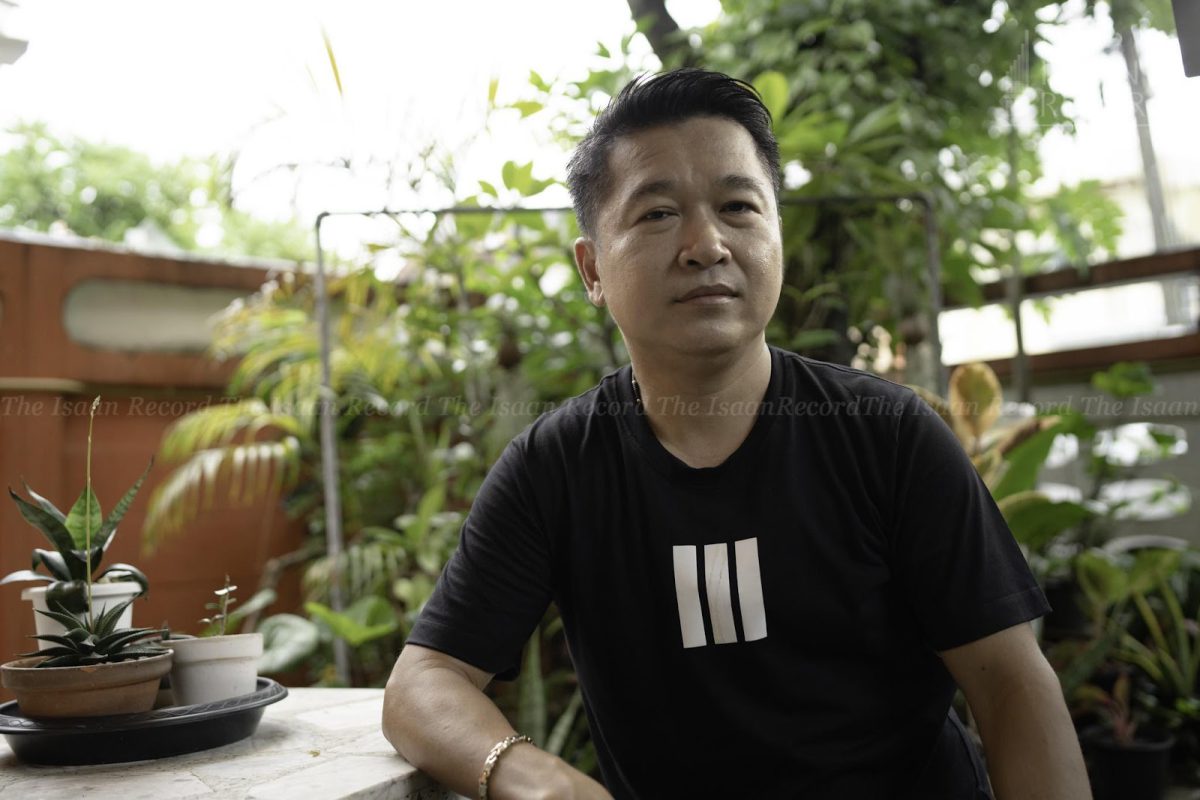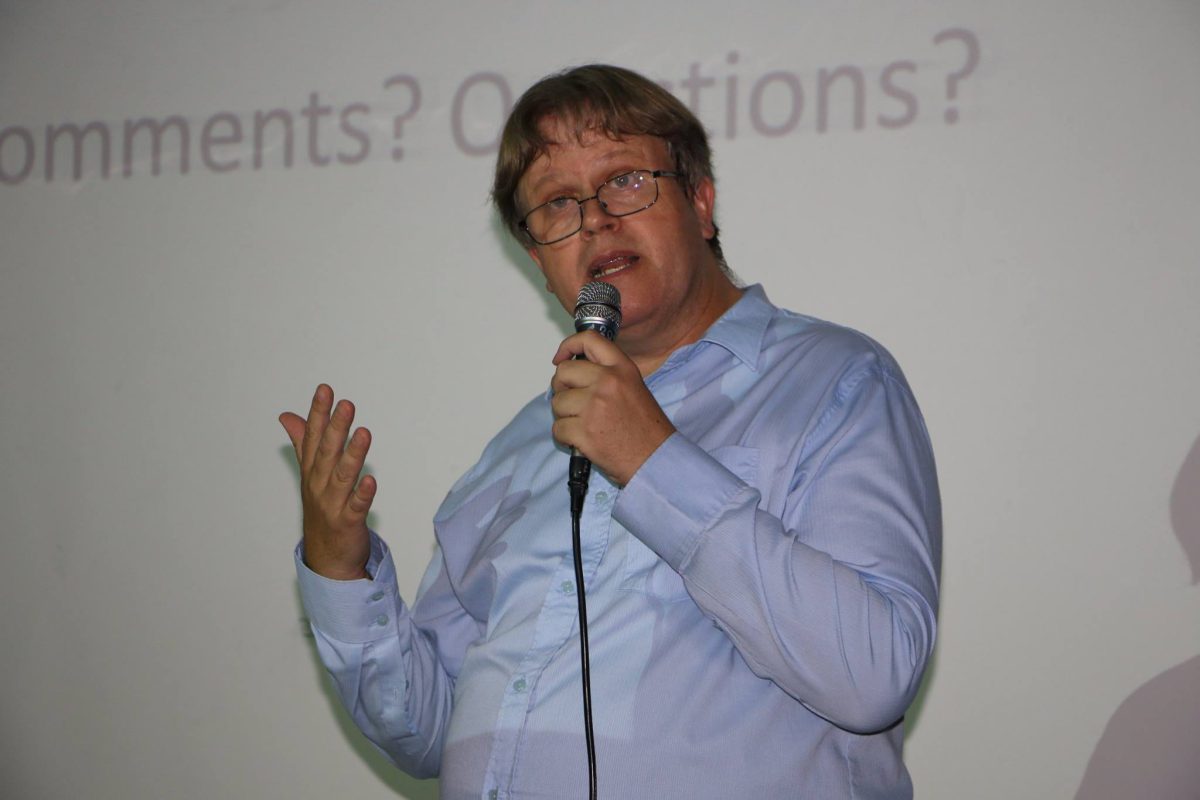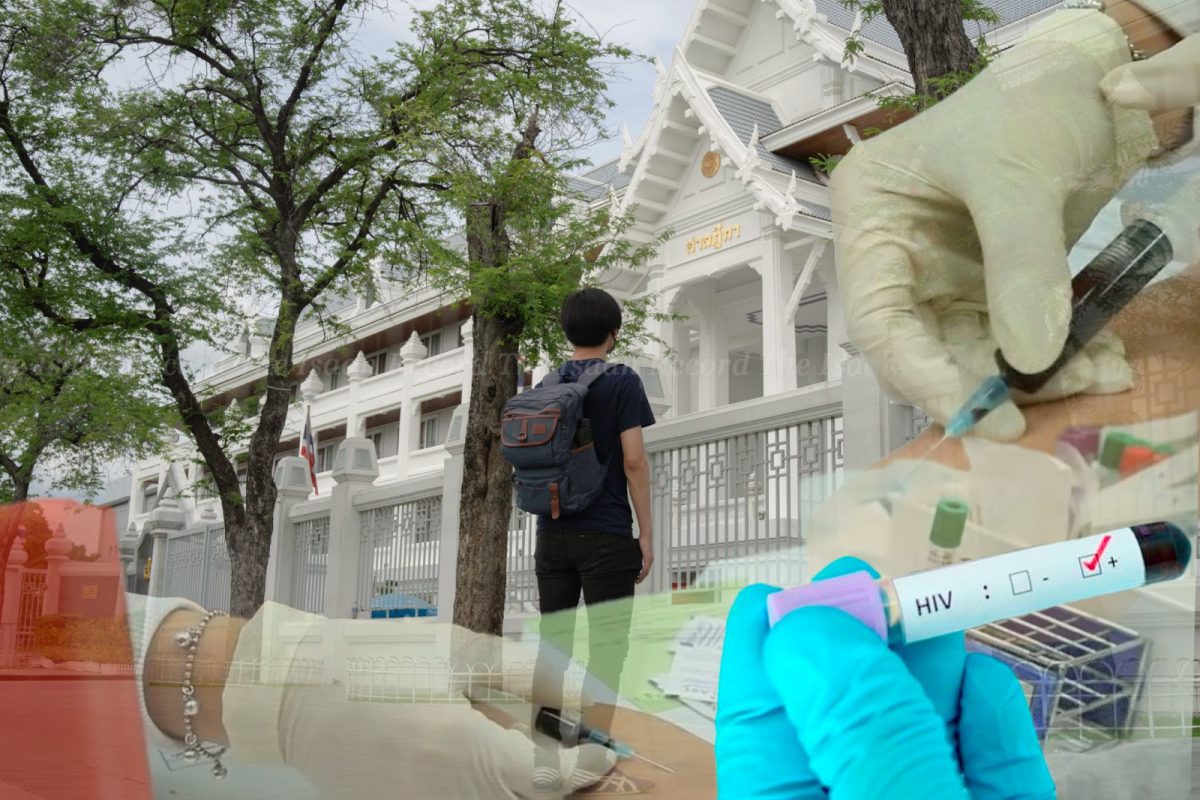
—Apiwat Kwangkaew, president of the Network of AIDS/HIV-positive People of Thailand.
By The Isaan Record
Fear stemming from a lack of understanding has stigmatized HIV-positive people for several decades. It has become a normal practice for many organizations, both public and private, to require a blood test in the job or education application process. To test HIV positive is used as grounds for rejection, although it’s a violation of basic rights.
Fortunately, some civil groups have been pushing for a new law to address the prejudice – the Elimination of Discrimination Against Individuals Act – which would help ease social exclusion not only for HIV-positive people but for all other maginarlized groups as well.
However, there’s a long road before this legislation can pass, and many obstacles lie ahead. Following is an interview with Apiwat Kwangkaew, the president of The Network of HIV/AIDS-positive people. He speaks to The Isaan Record about the drive behind the anti-discrimination law, and the silver lining of ending bigotry in society.
The Isaan Record: Why do you think it’s necessary to have a law that addresses discrimination? How will it benefit people who are HIV positive?
Apiwat Kwangkaew: It’s a supplementing law to the constitution that will eliminate discrimination in all its dimensions, especially for marginalized groups which include HIV-positive people as well.
The intention behind this law is to create an environment in which human rights are respected, a person’s body is respected, as we have become surrounded by discrimination that has been systematically normalized. Discrimination has become subtle, and some people don’t even realize they are being discriminate against.
IR: How are HIV positive people discriminated against?
AK: There are many instances, such as in a job application process. Organizations, both public and private, require a health checkup and on the list of tests is one for HIV. The test result is then sent to the company’s human resources department without the consent of the applicant.
Job or school applicants who are HIV-positive are rejected, which is clearly a violation. It deprives a youth or young person of opportunity in pursuing [work of] education. Education leads to security in life, the first door to a good quality of life, but they are stripped of the opportunity.
IR: What kind of jobs still discriminate against HIV-positive people by requiring a blood test?
AK: There are many organizations, especially in the public sector. It’s actually quite disappointing that agencies in the justice system, such as the police and the military, still require a blood test from applicants, which is a violation of human rights. Also, even judiciary agencies themselves violate applicant rights by forcing them to have a blood test.
This kind of discrimination crushes the hope of those children or young people with HIV and deprives them of dreaming to pursue these careers.
Although many hotels have already stopped asking for HIV tests [for job applications], many private organizations still require them. Restaurants or big shopping chain malls violate the rights of applicants by demanding a blood test before they can be accepted to the position. Even job promotions in some places require a health checkup, which includes a test for HIV as well.
All of this limits the opportunities of HIV-positive people. Regardless of the stage of their condition, they are denied access to jobs. They might already be in remission, or they might have been receiving treatment and the disease is no longer transmissible. There’s no reason not to recruit them at all. Many companies say they need to know the blood test results of the applicants. I just want to ask, “What for? You’re not a medical worker who might need to know [for your own safety]. You only want to know because you have a prejudice, is that right?”
I’d like to ask, do you judge people based on their skills or their blood test results? It’s a question that everyone needs to find an answer for. Many might say they need to consider both. But actually, a lot of people start a new job without having HIV and are forced to get a test for it. Then they actually contract HIV after joining these organizations, public or private. It shows that screening for HIV in the recruitment process cannot prevent someone from contracting it in the future. That’s a different story. These companies, whether public or private, need to reconsider and make a change.

IR: There was an announcement saying companies, clinics or hospitals would no longer be allowed to require HIV tests [for employment purposes]. Why do they still keep doing it?
AK: The health ministry once said that no establishment, either public and private, including clinics and labs, are to be allowed to run blood tests for HIV and send them to a third party. It’s quite a serious ethics violation. It looked like things were improving for a while. Many places have stopped doing it, but some still do. Back then, many private labs stopped briefly, and then went back to doing it again discreetly.
It’s regrettable that some private establishments still violate patient rights, violate their bodily rights. Therefore, there should be some system in place, or a continuous campaign, to remind the places where this kind of HIV testing persists that it is not allowed. It’s wrong. We need to stop this cycle.
IR: How much hope do you have, that this cycle can be broken?
AK: I always have hope. I’ll have to keep working. I think the key thing is to be able to have understanding, and to be able to communicate. Therefore, those discriminated against must not allow it to happen. Don’t submit to it. There are ways to make complaints, and there are [government] agencies that can advise on this matter. Once someone, just one, files a complaint, it will trigger the system to handle the matter and protect the right of the complainer to fix this problem. It will also help educate the establishment or the lab that makes the violation as well.
I think this is the way that will gradually help improve the situation. For an even better result, government agencies need to be the ones setting an example. They must be bold and take a stand and say that ministries, bureaus, or other in related departments must not tolerate human rights violations, and do not adopt a policy requiring HIV tests from those applying to be a civil servant, as the Office of the Civil Service Commission stopped doing this a long time ago.
IR: In October, the National Human Rights Commission [NHRCT]revealed that five to six people have filed complaints for this kind of blood test requirement. Will these cases help nudge a motion of this legislation in Parliament?
AK: I think it’s a very good thing that the NHRCT revealed that information. However, just talking about the fact or showing data of HIV-positive people being discriminated against is not going to be enough. They must also take some action.
We don’t want just a paper tiger. We want a system to help us achieve a goal. I’d like to commend the NHRCT for speaking out, and at the same time we must find a way to solve and end this problem.
IR: Will there be punishment for offenders in this law?
AK: This law encourages a positive solution, not only for those who have been subject to discrimination but also for the offenders, because we want to create an awareness and build up a new environment. Therefore, this anti-discrimination act doesn’t only aim for penalizing offenders, but also to promoting awareness.
The heart of this law is about helping those discriminated against and those discriminating to understand each other better. It also sets up a rehabilitation process that can lead to change for a better future.

IR: What stage is the law at right now?
AK: Now we have already collected 10,000 signatures supporting the measure from our network, but we haven’t proposed it yet [to Parliament]. We must take careful consideration due to the current political climate under this government. At the same time, we try to build up support for the law by talking to both the government and to the opposition. That has been our process. We also try to talk to other related agencies, such as the Rights and Liberties Protection Department.
It will take time to pass this law. We need people in politics and the policymakers to understand it first.
Although there is no opposition at the moment, looking at the bigger picture, the law might be considered related to finance. The constitution requires all financial legislations to be approved by the prime minister. Looking at the past proposals from civil organizations, you’ll see the prime minister never approved any of them.
This is one thing that concerns us, as it’s a financial law. The past experience has reflected that Thailand’s politics has very little regard for citizens. When they propose any law related to finance, the prime minister dismisses them all.
IR: So you’ve already accepted, from the previous examples, that a legislative proposal led by a civil organization might not even be considered?
AK: We have to put pressure on policymakers and political parties, including the prime minister, to have some respect for a law proposed directly from the public, because tens of thousands of their citizens have, in support, put their signatures on it.
We hope that if true democracy is achieved, if our House of Representatives functions properly, it is a good opportunity to continue to push our demands. But when that will be accomplished is another story.
IR: How long do you think it will take before this law is passed and enacted?
AK: As its author, I’d like it to happen as soon as possible. However, it’s hitting a bottleneck reaching the higher-ups, which is a reality in this society. I see the obstacles but I must press on, and keep surveying opinions on how it should be done. As a citizen, I’ve done the best that I can, insomuch as the structure would allow us. The rest of it will rely on the work of the House of Representatives.
IR: If this legislation is passed and becomes law, but in practice the attitude of people or operators [of organizations] remains the same, how will you go from there?
AK: A law is just a tool to manage the system and policies. When it comes to attitudes, I think they need to go through a process of reaching an understanding. The environment needs to be adjusted to build up a new kind of atmosphere and communication. We need to change the way we communicate, and focus on promoting awareness, making people see the risks and then to learn.
I think the atmosphere is getting better because the AIDS death rate is decreasing. We have universal healthcare, and whoever contracts it is able to receive treatment immediately. However, one crucial factor that remains unchanged is policymakers, whether public or private. We need to promote awareness, not fear. Fear is exactly the thing that causes prejudice that makes people violate others’ rights without even realizing it. That needs to be changed.
The crisis of the COVID-19 pandemic is another example showing the culture of fear-mongering, causing panic. It’s been the same for HIV. The government thinks people need to be afraid of it in order to become careful.
Fear cannot solve the problem. Instead, facts and correct information need to be promoted. When people understand more, they become less scared. Then, they will be open to something new, and the atmosphere will continue to improve.
NOTE: This article is produced as part of a collaboration between The Isaan Record and the HIV-positive youth network and HIV/AIDS-positive network of Thailand, with support from UNICEF Thailand.
Read Thai version here





